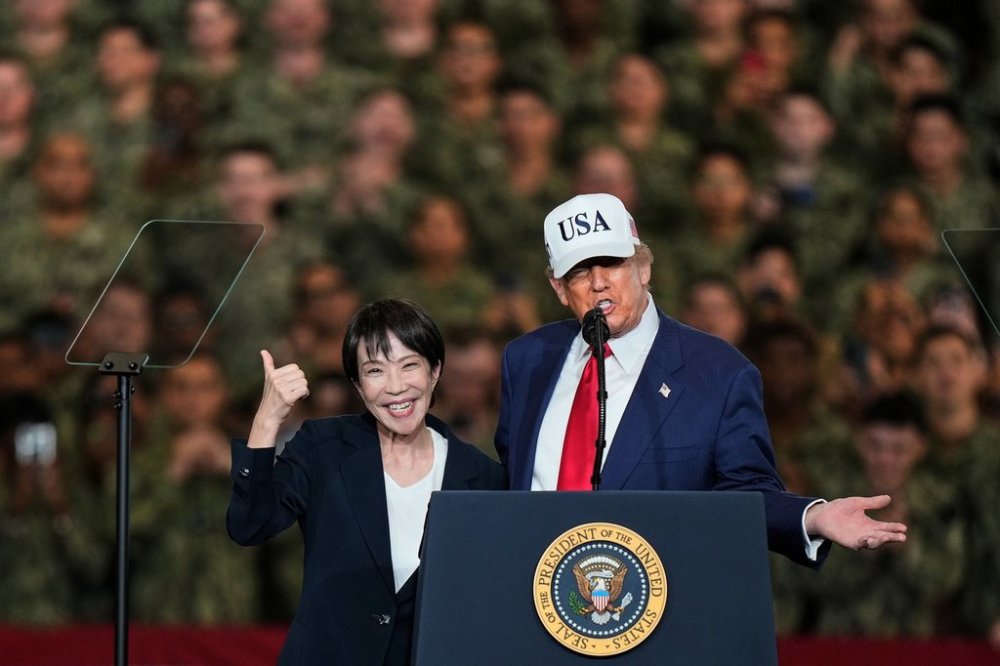Japan’s leader says Trump called her as dispute with China doesn’t go away
Advertisement
Read this article for free:
or
Already have an account? Log in here »
To continue reading, please subscribe:
Monthly Digital Subscription
$0 for the first 4 weeks*
- Enjoy unlimited reading on winnipegfreepress.com
- Read the E-Edition, our digital replica newspaper
- Access News Break, our award-winning app
- Play interactive puzzles
*No charge for 4 weeks then price increases to the regular rate of $19.00 plus GST every four weeks. Offer available to new and qualified returning subscribers only. Cancel any time.
Monthly Digital Subscription
$4.75/week*
- Enjoy unlimited reading on winnipegfreepress.com
- Read the E-Edition, our digital replica newspaper
- Access News Break, our award-winning app
- Play interactive puzzles
*Billed as $19 plus GST every four weeks. Cancel any time.
To continue reading, please subscribe:
Add Free Press access to your Brandon Sun subscription for only an additional
$1 for the first 4 weeks*
*Your next subscription payment will increase by $1.00 and you will be charged $16.99 plus GST for four weeks. After four weeks, your payment will increase to $23.99 plus GST every four weeks.
Read unlimited articles for free today:
or
Already have an account? Log in here »
TOKYO (AP) — Japan’s Prime Minister Sanae Takaichi, who recently triggered China’s fury with a comment about Taiwan, said Tuesday that she received a call from U.S. President Donald Trump right after he spoke with China’s leader.
Takaichi, a hard-line conservative, said Trump expressed his friendship to her in a call he made to her Tuesday after a phone conversation with Chinese leader Xi Jinping.
“President Trump told me that he and I are extremely good friends and that I should call him any time,” Takaichi said in brief remarks made to reporters at the prime minister’s office in Tokyo. Takaichi, however, did not say whether they discussed her Taiwan comment.

Only weeks into her job as Japan’s first female prime minister, Takaichi infuriated China by suggesting Japan could respond militarily if China were to try to seize control of Taiwan, the self-governing island that Beijing says must come under its rule.
The remark earlier this month broke with Japan’s longstanding policy of strategic ambiguity. Takaichi said a Chinese attack on Taiwan could constitute “a survival-threatening situation” for Japan requiring the use of force.
China responded with anger and by putting economic pressure on Japan. On Sunday, Chinese Foreign Minister Wang Yi said Takaichi “crossed a red line.” He said China would “resolutely respond” to Japan’s actions and that all countries have the responsibility to “prevent the resurgence of Japanese militarism.”
Takaichi said Trump briefed her on his overnight phone call with China’s Xi and the current state of U.S.-China relations. She said that she and Trump also discussed strengthening the Japan-U.S. alliance and “development and challenges that the Indo-Pacific region is faced with.”
“We confirmed the close coordination between Japan and the United States,” she said.
She declined, however, to give any other details of her talks with Trump, citing diplomatic protocol.
Japan has sought to deescalate the spat, but China has shown no signs of easing its fury and has canceled official meetings and private exchanges and advised its citizens against travel to Japan.
Japan has resisted China’s demand that Takaichi retract the comment, repeating that its support for a peaceful resolution of the Taiwan Strait issue is unchanged.
The U.S. has taken no side on the sovereignty of the self-governed island but is opposed to the use of force to seize Taiwan. Trump has maintained strategic ambiguity about whether U.S. troops would be sent in case of a war in the Taiwan Strait.
Trump said nothing publicly about Taiwan, whereas a Chinese statement said Trump told Xi that the U.S. “understands how important the Taiwan question is to China.”
The dispute between the East Asian neighbors has spilled over to the international arena as Beijing has taken the spat with Japan to the United Nations, with both sides calling each other’s accusations “erroneous.”

